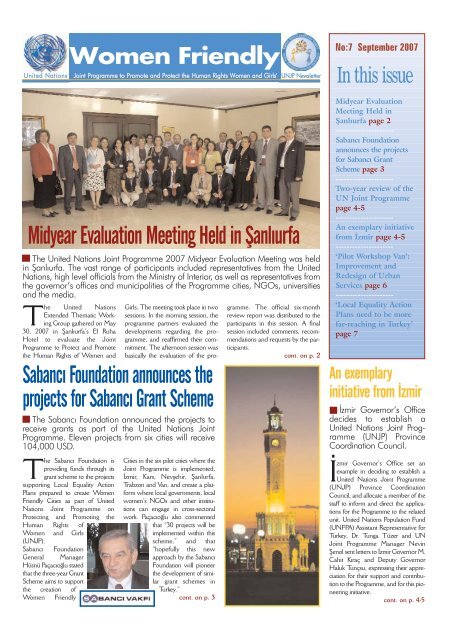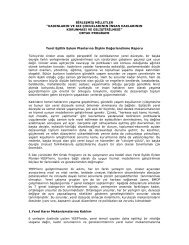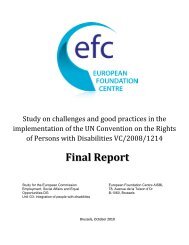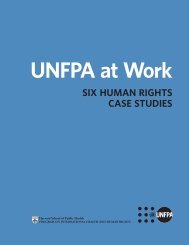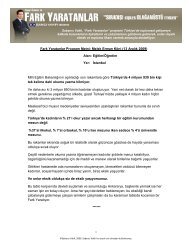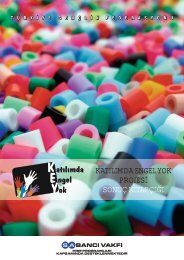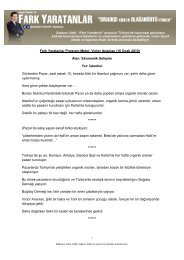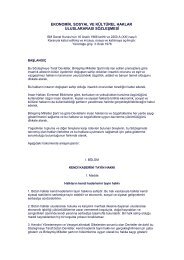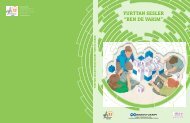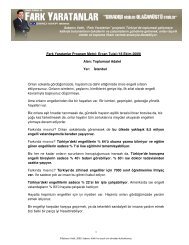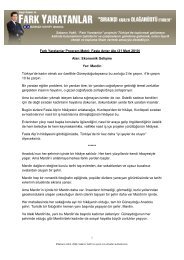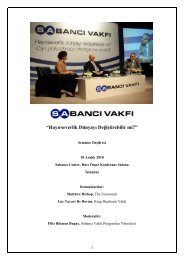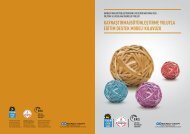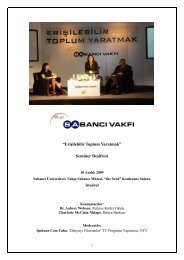Women Friendly Midyear Evaluation Meeting Held in Åanlıurfa
Women Friendly Midyear Evaluation Meeting Held in Åanlıurfa
Women Friendly Midyear Evaluation Meeting Held in Åanlıurfa
Create successful ePaper yourself
Turn your PDF publications into a flip-book with our unique Google optimized e-Paper software.
United Nations<strong>Women</strong> <strong>Friendly</strong>Jo<strong>in</strong>t Programme to Promote and Protect the Human Rights <strong>Women</strong> and Girls' UNJP Newsletter<strong>Midyear</strong> <strong>Evaluation</strong> <strong>Meet<strong>in</strong>g</strong> <strong>Held</strong> <strong>in</strong> ÞanlýurfaThe United Nations Jo<strong>in</strong>t Programme 2007 <strong>Midyear</strong> <strong>Evaluation</strong> <strong>Meet<strong>in</strong>g</strong> was held<strong>in</strong> Þanlýurfa. The vast range of participants <strong>in</strong>cluded representatives from the UnitedNations, high level officials from the M<strong>in</strong>istry of Interior, as well as representatives fromthe governor’s offices and municipalities of the Programme cities, NGOs, universitiesand the media.The United NationsExtended Thematic Work<strong>in</strong>gGroup gathered on May30, 2007 <strong>in</strong> Þanlýurfa’s El RuhaHotel to evaluate the Jo<strong>in</strong>tProgramme to Protect and Promotethe Human Rights of <strong>Women</strong> andThe Sabancý Foundation isprovid<strong>in</strong>g funds through itsgrant scheme to the projectssupport<strong>in</strong>g Local Equality ActionPlans prepared to create <strong>Women</strong><strong>Friendly</strong> Cities as part of UnitedNations Jo<strong>in</strong>t Programme onProtect<strong>in</strong>g and Promot<strong>in</strong>g theHuman Rights of<strong>Women</strong> and Girls(UNJP).Sabancý FoundationGeneral ManagerHüsnü Paçacýoðlu statedthat the three-year GrantScheme aims to supportthe creation of<strong>Women</strong> <strong>Friendly</strong>Sabancý Foundation announces theprojects for Sabancý Grant SchemeThe Sabancý Foundation announced the projects toreceive grants as part of the United Nations Jo<strong>in</strong>tProgramme. Eleven projects from six cities will receive104,000 USD.Cities <strong>in</strong> the six pilot cities where theJo<strong>in</strong>t Programme is implemented,Ýzmir, Kars, Nevþehir, Þanlurfa,Trabzon and Van, and create a platformwhere local governments, localwomen’s NGOs and other <strong>in</strong>stitutionscan engage <strong>in</strong> cross-sectoralwork. Paçacýoðlu also commentedthat “30 projects will beimplemented with<strong>in</strong> thisscheme,” and that“hopefully this newapproach by the SabancýFoundation will pioneerthe development of similargrant schemes <strong>in</strong>Turkey.”cont. on p. 3Girls. The meet<strong>in</strong>g took place <strong>in</strong> twosessions. In the morn<strong>in</strong>g session, theprogramme partners evaluated thedevelopments regard<strong>in</strong>g the programme,and reaffirmed their commitment.The afternoon session wasbasically the evaluation of the programme.The official six-monthreview report was distributed to theparticipants <strong>in</strong> this session. A f<strong>in</strong>alsession <strong>in</strong>cluded comments, recommendationsand requests by the participants.cont. on p. 2No:7 September 2007In this issue<strong>Midyear</strong> <strong>Evaluation</strong><strong>Meet<strong>in</strong>g</strong> <strong>Held</strong> <strong>in</strong>Þanlýurfa page 2---------------------Sabancý Foundationannounces the projectsfor Sabancý GrantScheme page 3---------------------Two-year review of theUN Jo<strong>in</strong>t Programmepage 4-5---------------------An exemplary <strong>in</strong>itiativefrom Ýzmir page 4-5---------------------‘Pilot Workshop Van’:Improvement andRedesign of UrbanServices page 6---------------------‘Local Equality ActionPlans need to be morefar-reach<strong>in</strong>g <strong>in</strong> Turkey’page 7An exemplary<strong>in</strong>itiative from ÝzmirÝzmir Governor’s Officedecides to establish aUnited Nations Jo<strong>in</strong>t Programme(UNJP) Prov<strong>in</strong>ceCoord<strong>in</strong>ation Council.Ýzmir Governor’s Office set anexample <strong>in</strong> decid<strong>in</strong>g to establish aUnited Nations Jo<strong>in</strong>t Programme(UNJP) Prov<strong>in</strong>ce Coord<strong>in</strong>ationCouncil, and allocate a member of thestaff to <strong>in</strong>form and direct the applicationsfor the Programme to the relatedunit. United Nations Population Fund(UNFPA) Assistant Representative forTurkey, Dr. Tunga Tüzer and UNJo<strong>in</strong>t Programme Manager Nev<strong>in</strong>Þenol sent letters to Ýzmir Governor M.Cahit Kýraç and Deputy GovernorHaluk Tunçsu, express<strong>in</strong>g their appreciationfor their support and contributionto the Programme, and for this pioneer<strong>in</strong>g<strong>in</strong>itiative.cont. on p. 4-5
2<strong>Midyear</strong> <strong>Evaluation</strong> <strong>Meet<strong>in</strong>g</strong><strong>Held</strong> <strong>in</strong> ÞanlýurfaThe United Nations Jo<strong>in</strong>t Programme 2007 <strong>Midyear</strong><strong>Evaluation</strong> <strong>Meet<strong>in</strong>g</strong> was held <strong>in</strong> Þanlýurfa. The vast range ofparticipants <strong>in</strong>cluded representatives from the United Nations,high level officials from the M<strong>in</strong>istry of Interior, as well as representativesfrom the governor’s offices and municipalities ofthe Programme cities, NGOs, universities and the media.The Chair of the Board of Trusteesof Sabancý Foundation GülerSabancý congratulates the w<strong>in</strong>nersfrom Þanlýurfa of the <strong>Women</strong><strong>Friendly</strong> City Essay Competitionamong high school students.The United Nations Extended GenderThematic Group gathered on May 30,2007 <strong>in</strong> Þanlýurfa’s El Ruha Hotel to evaluatethe United Nations Jo<strong>in</strong>t Programme to Protectand Promote the Human Rights of <strong>Women</strong> andGirls (UNJP).The meet<strong>in</strong>g took place <strong>in</strong> two sessions. In the morn<strong>in</strong>gsession, the Programme partners talked about thedevelopments regard<strong>in</strong>g the Programme, and reaffirmedtheir commitment. The afternoon sessionwas basically the evaluation of the Programme. Theofficial six-month review report was distributed tothe participants <strong>in</strong> this session. A f<strong>in</strong>al session <strong>in</strong>cludedcomments, recommendations and requests by theparticipants.United Nations Population Fund (UNFPA) AssistantRepresentative for Turkey, Dr. Tunga Tüzer openedthe meet<strong>in</strong>g, comment<strong>in</strong>g that the United NationsJo<strong>in</strong>t Programme was <strong>in</strong>itiated with an <strong>in</strong>clusive andparticipatory approach, as opposed to the conventionaltop-down, centralized approach, add<strong>in</strong>g thatthe ma<strong>in</strong> purpose of the Programme is to support thecreation of <strong>Women</strong> <strong>Friendly</strong> Cities. Dr. Tüzer alsosaid that the Jo<strong>in</strong>t Programme is supported by all ofthe United Nations agencies <strong>in</strong> Turkey, and that it isa pioneer<strong>in</strong>g programme <strong>in</strong> creat<strong>in</strong>g partnershipsamong civil society, bilaterals, public and private sectors.He asserted that the next step will be focus<strong>in</strong>gon the Local Equality Action Plans and the establishmentof the <strong>Women</strong> <strong>Friendly</strong> Cities.The Chair of the Board of Trustees of SabancýFoundation Güler Sabancý said that the SabancýFoundation aims to “create <strong>Women</strong> <strong>Friendly</strong> Citiesthrough <strong>in</strong>clusion of women <strong>in</strong>to decision mak<strong>in</strong>gmechanisms, design<strong>in</strong>g models for provision ofwomen-friendly local services, capacity build<strong>in</strong>g <strong>in</strong>local governments and NGOS, and preparation ofaction plans.”M<strong>in</strong>istry of Interior UNJP National DirectorMustafa Çöðgün stated that the transparent and participatorystructure of the Jo<strong>in</strong>t Programme hasbecome an exemplary model, and that the M<strong>in</strong>istryof Interior will cont<strong>in</strong>ue to support the Programme.Þanlýurfa Governor Yusuf Yavaþcan and ÞanlýurfaDeputy Mayor Fevzi Yücetepe also expressed theirfull conviction <strong>in</strong> the success of the Programme.The UN Jo<strong>in</strong>t Programme Manager Nev<strong>in</strong> Þenol<strong>in</strong>formed the partners on the progress of theProgramme <strong>in</strong> the afternoon session, and providedthe participants with a draft calendar for the com<strong>in</strong>gsix months.Programme Consultant academic Deniz Altay madea presentation on the results and f<strong>in</strong>d<strong>in</strong>gs of the<strong>Women</strong> <strong>Friendly</strong> City projects, implemented withuniversity students <strong>in</strong> Van. Ayþe Yüksel from SabancýUniversity also made a presentation on the series ofmeet<strong>in</strong>gs with high school teachers and universityacademics on rais<strong>in</strong>g awareness on gender equality,the ‘Purple Certificate Program’ for local high schoolteachers that took place <strong>in</strong> July 2007, and the‘National Symposium on <strong>Women</strong> and GenderStudies <strong>in</strong> the University.’ The f<strong>in</strong>al, Questions andAnswers session <strong>in</strong>cluded comments, recommendationsand request by the participants. The vast rangeof participants <strong>in</strong>cluded representatives from theUnited Nations, and representatives from the governor’soffices and municipalities of the Programmecities, NGOs, universities and the media.The vast range of participants <strong>in</strong>cluded representativesfrom the United Nations, high levelofficials from the M<strong>in</strong>istry of Interior, as wellas representatives from the governor’soffices and municipalities of the Programmecities, NGOs, universities and the media.
3Sabancý Foundationgrantees announcedThe Sabancý Foundation announced the projects to receive grants aspart of the United Nations Jo<strong>in</strong>t Programme. Eleven projects from sixcities will receive 104,000 USD.The Sabancý Foundation is provid<strong>in</strong>g fundsthrough its grant scheme to the projectssupport<strong>in</strong>g Local Equality Action Plansprepared to create <strong>Women</strong> <strong>Friendly</strong> Cities aspart of United Nations Jo<strong>in</strong>t Programme onProtect<strong>in</strong>g and Promot<strong>in</strong>g the Human Rights of<strong>Women</strong> and Girls (UNJP).Sabancý Foundation General Manager HüsnüPaçacýoðlu stated that the three-year GrantScheme aims to support the creation of <strong>Women</strong><strong>Friendly</strong> Cities <strong>in</strong> the six pilot cities where theJo<strong>in</strong>t Programme is implemented, Ýzmir, Kars,Nevþehir, Þanlurfa, Trabzon and Van, and createa platform where local governments, localwomen’s NGOs and other <strong>in</strong>stitutions canengage <strong>in</strong> cross-sectoral work. Paçacýoðlu alsocommented that “30 projects will be implementedwith<strong>in</strong> this scheme,” and that “hopefully thisnew approach by the Sabancý Foundation willpioneer the development of similar grant schemes<strong>in</strong> Turkey.”Paçacýoðlu said that 104,000 USD will be providedto the eleven projects awarded with theSabancý Foundation grants. He commented that,“the local governments and NGOs <strong>in</strong> the sixProgramme cities have been work<strong>in</strong>g <strong>in</strong> cooperationfor the last two years, and have prepared theLocal Equality Action Plans and priorities accord<strong>in</strong>gly.The project proposals that were awardedwith grants fell <strong>in</strong>to one of the ma<strong>in</strong> focus areasof the Local Equality Action Plans, which arewomen’s participation <strong>in</strong> local decision mak<strong>in</strong>g,urban services focus<strong>in</strong>g on the needs of womenand girls, economic empowerment and employment,education and health services, migrationand poverty, change of mentality and awarenessrais<strong>in</strong>g.Paçacýoðlu said that, “The Sabancý Foundationgrants will support active participation <strong>in</strong> localgovernments, empowerment of women, andpromote social change and development,” andthat “the implementation of the selected projectsthrough cooperation between the local governmentsand the NGOs will ensure the susta<strong>in</strong>abilityand expansion of the projects <strong>in</strong> the future.”Sabancý Foundation General Manager Paçacýoðlualso expressed his appreciation to Jo<strong>in</strong>t Programpartners and thanked all United Nations agencieswork<strong>in</strong>g <strong>in</strong> Turkey, the M<strong>in</strong>istry of Interior,Sabancý University, eight donor governments,local governments and NGOs <strong>in</strong> Turkey for theirf<strong>in</strong>ancial support and assistance <strong>in</strong> develop<strong>in</strong>glocal capacity, creat<strong>in</strong>g Local Equality ActionPlans and support<strong>in</strong>g projects which have been acrucial part of the grant scheme process..CITY PROJECT NAME PROJECT OWNERÝzmir To Start with Read<strong>in</strong>g and Writ<strong>in</strong>g Ýzmir MunicipalityÝzmir Awareness Rais<strong>in</strong>g on Domestic Violence Among Men Aegean <strong>Women</strong>’s Support FoundationKars Municipality and NGO: Hand <strong>in</strong> Hand Kars MunicipalityKars <strong>Women</strong> <strong>in</strong> Local Decision Mak<strong>in</strong>gKars Governorship and Department for Prov<strong>in</strong>cialAdm<strong>in</strong>istrationNevþehir Produc<strong>in</strong>g and Market<strong>in</strong>g Handicrafts Association for Cappadocia <strong>Women</strong>’s SolidarityÞanlýurfaThe Sabancý Foundation GrantScheme Programme Jury determ<strong>in</strong>edthe w<strong>in</strong>n<strong>in</strong>g projects upon athorough assessmentThe w<strong>in</strong>n<strong>in</strong>g projects and granteesImprovement of The Right to Health for Seasonal <strong>Women</strong> andChild Workers through Mobile Health ServicesThe SabancýFoundation GeneralManager HüsnüPaçacýoðlu.Harran University, Faculty of Medic<strong>in</strong>e, Department of PublicHealthÞanlýurfa Awareness Rais<strong>in</strong>g on Domestic Violence Life House (Yaþamevi) <strong>Women</strong>’s Solidarity AssociationTrabzon Work<strong>in</strong>g Woman is Empowered Woman Association for Turkish Mothers, Trabzon BranchTrabzon To Support for Mothers of Bl<strong>in</strong>d Children Six Po<strong>in</strong>t Association for the Bl<strong>in</strong>d Trabzon BranchVan Towards Healthy and Conscious Generations Van Governor’s Office, Department of Community Tra<strong>in</strong><strong>in</strong>gVan Develop<strong>in</strong>g Database for <strong>Women</strong>’s Counsel<strong>in</strong>g Center Van <strong>Women</strong>’s Association
4 5Dur<strong>in</strong>g the last decades, Turkey has been witness<strong>in</strong>gimportant achievements on women’s participation<strong>in</strong> every walk of life. Much progress hasbeen made <strong>in</strong> the past decade, particularly with the passageof key legislation to protect and promote the humanrights of women and girls. However, these reforms haveyet to be fully <strong>in</strong>corporated <strong>in</strong>to daily lives of peoplewhere gender <strong>in</strong>equality rema<strong>in</strong>s a significant obstacle fordevelopment.Individual funds and United Nations (UN) agencieshave provided assistance to the projects to promotewomen’s rights, approach<strong>in</strong>g the issue from many differentangles. By jo<strong>in</strong><strong>in</strong>g forces <strong>in</strong> this programme, the UNis able to provide <strong>in</strong>volved local partners with a comprehensivepackage of support to address women’s rightsand protect women. The UN Reform demands that theUN agencies go beyond coord<strong>in</strong>ation and <strong>in</strong>formationshar<strong>in</strong>g to pool resources for jo<strong>in</strong>t programmes. By jo<strong>in</strong><strong>in</strong>gboth f<strong>in</strong>ancial resources and expertise, these programmesare able to provide the most effective means ofaddress<strong>in</strong>g the many facets of specific development challenges.In addition, the UN Jo<strong>in</strong>t Programme is designedto articulate with other relevant <strong>in</strong>dividual agency programmesacross Turkey. The UN agencies have collectivelypledged to provide one-third of the f<strong>in</strong>ancial supportnecessary to complete the Programme. Currently,United Nations Population Fund (UNFPA), UnitedNations Development Programme (UNDP), UnitedNations Children’s Fund (UNICEF), United NationsRefugee Agency (UNHCR) and International LabourOrganization (ILO) have contributed to the Programme.The United Nations Jo<strong>in</strong>t Programme (UNJP) is specificallydesigned to <strong>in</strong>corporate funds not just from theUN agencies but also from bilateral donors and the privatesector. Bilateral donors have contributed significantlyto projects to improve gender equality <strong>in</strong> Turkey, particularly<strong>in</strong> light of Turkey’s prospective European Union(EU) membership. The UN Jo<strong>in</strong>t Programme acts as avehicle for comb<strong>in</strong><strong>in</strong>g and rationaliz<strong>in</strong>g bilateral aid forgender equality and provides a platform for active partnershipsand dialogue between donors, the Governmentof Turkey, NGOs and other local stakeholders.The Programme is actively encourag<strong>in</strong>g collaborationwith other women’s rights programmes, <strong>in</strong>clud<strong>in</strong>g EUand bilateral donor-funded programmes, municipal andNGO activities. The Programme envisions one-third off<strong>in</strong>ancial support for the Programme to come from bilateraldonors. At present, embassies of Canada, Denmark,Germany, F<strong>in</strong>land, Norway, Sweden, Switzerland andUnited K<strong>in</strong>gdom have f<strong>in</strong>ancially contributed to theimplementation of the Programme, while the embassy ofFrance recently committed to become a bilateral donorfor the Programme as well.The UN Jo<strong>in</strong>t Programme is also designed to <strong>in</strong>corporatethe private sector <strong>in</strong>to its activities. In recent years,corporate social responsibility has grown <strong>in</strong> Turkey. Bothmult<strong>in</strong>ational corporations operat<strong>in</strong>g <strong>in</strong> Turkey and localcompanies are prioritiz<strong>in</strong>g <strong>in</strong>vestment <strong>in</strong> projects that promoteTurkey’s development. In prelim<strong>in</strong>ary discussionsdur<strong>in</strong>g the preparation of the Programme, UN agenciesprovided significant supportfor the Programme alongwith the private sector companies.The Programme isdesigned to <strong>in</strong>corporatelocal chambers of commerce,thereby engag<strong>in</strong>g local level private support earlyon and encourag<strong>in</strong>g <strong>in</strong>vestment <strong>in</strong> the Programme. It isenvisioned that the private sector will donate one-third ofthe f<strong>in</strong>ancial support necessary to complete theProgramme. S<strong>in</strong>ce June 2006, the Sabancý Foundationhas been support<strong>in</strong>g the Programme with funds thatmake up one-third of the Programme budget. On March2007, Sabancý Foundation launched its grant scheme,designed to support locally owned Local Equality ActionPlans, prepared by local partners <strong>in</strong> the Programme citiesfor creat<strong>in</strong>g <strong>Women</strong> <strong>Friendly</strong> Cities. The grant schemewill cont<strong>in</strong>ue for three years with a total budget of300,000 USD.While f<strong>in</strong>ancial support for the Programme is com<strong>in</strong>gfrom the UN, bilateral donors and the private sector, theProgramme also relies on local government support.Specifically, local governments are provid<strong>in</strong>g <strong>in</strong> k<strong>in</strong>d supportand will help to fund implementation of the localaction plans, which are be<strong>in</strong>g developed as part of theProgramme. Capacity build<strong>in</strong>g activities are help<strong>in</strong>g localgovernment officials develop their resource mobilizationskills as well as a strategy for fundrais<strong>in</strong>g activities to supportlocal action plans.The two-year UN Jo<strong>in</strong>t Programme is designed to,• address persistent gender <strong>in</strong>equalities by improv<strong>in</strong>g thenational policy environment,• build local government and NGO capacity,• design service models for women and girls, and• raise awareness about women and girls’ rights.The UN Jo<strong>in</strong>t Programme is be<strong>in</strong>g implemented by theUN, the M<strong>in</strong>istry of the Interior, Sabancý Foundation andAssociation for Tra<strong>in</strong><strong>in</strong>g and Support<strong>in</strong>g <strong>Women</strong>Candidates (KA-DER) Ankara. Sabancý University alsoprovides support for change of mentality and rais<strong>in</strong>gawareness component of the Jo<strong>in</strong>t Programme.The Programme primarily targets national level decisionmakers as well as local government, NGOs and the generalpublic <strong>in</strong> six cities: Ýzmir, Kars, Nevþehir,Þanlýurfa, Trabzon and Van. The cities were chosenaccord<strong>in</strong>g to municipal read<strong>in</strong>ess and capacityto participate <strong>in</strong> the Programme and perceivedneeds as expressed <strong>in</strong> prelim<strong>in</strong>ary city visits. Thesecities were selected to demonstrate how participatoryand coord<strong>in</strong>ated cross-sectoral approachescan improve services, augment resource availabilityand improve the lives of girls and women <strong>in</strong> avariety of sett<strong>in</strong>gs.The Programme cities were determ<strong>in</strong>ed accord<strong>in</strong>gto the eagerness and capacity of the local governments,as well as the needs verified dur<strong>in</strong>g the visitsmade <strong>in</strong> the preparation stage. These cities wereselected to demonstrate how adopt<strong>in</strong>g a participatory,coord<strong>in</strong>ated and cross-sectoral approach candevelop and diversify services, <strong>in</strong>crease resourcesand improve the lives of women and girls.The UN Jo<strong>in</strong>t Programme is provid<strong>in</strong>g support forwomen and girls <strong>in</strong> the Programme cities to be ableto claim services from <strong>in</strong>stitutions responsible forservice provision. The Programme has identifiedthe needs of women and girls, engaged <strong>in</strong> capacitybuild<strong>in</strong>g and facilitated stakeholders to prepareLocal Equality Action Plans (LEAPs), reflect<strong>in</strong>g thepriorities of each city. The implementation of theLEAPs is also supported through the SabancýTwo-year review of the Jo<strong>in</strong>t ProgrammeThe United Nations Jo<strong>in</strong>t Programme Manager Nev<strong>in</strong> Þenol reviewed theJo<strong>in</strong>t Programme s<strong>in</strong>ce its kick off two years ago. Þenol summarized the developmentsand activities of the Jo<strong>in</strong>t Programme, as well as expectations for thefuture.Foundation grant scheme.By the end of the Programme, a scal<strong>in</strong>g-up model atnational level will be <strong>in</strong> place and the six cities will beevaluated for certification as ‘<strong>Women</strong> <strong>Friendly</strong> Cities’based on commonly agreed upon criteria.The UN Jo<strong>in</strong>t Programme is designed to address theabove-mentioned development and gender equalitychallenges. At the end of an implementation period of 21months, the follow<strong>in</strong>g results are achieved:- Four national meet<strong>in</strong>gs were held <strong>in</strong> March, June,December 2006 and May 2007, with the participation ofaround 1000 people, <strong>in</strong>clud<strong>in</strong>g high level representativesfrom the M<strong>in</strong>istry of Interior, the Chair of the Board ofTrustees of Sabancý Foundation, Güler Sabancý, governorsand mayors of the six Programme cities, representativesfrom donor embassies, Sabancý Foundation, KA-DER, as well as academics and representatives fromNGOs.- N<strong>in</strong>e stakeholder meet<strong>in</strong>gs were realized <strong>in</strong> the sixProgramme cities with the participation of high level localgovernment representatives <strong>in</strong>clud<strong>in</strong>g governors andmayor as well as local women’s NGOs. Hundreds ofparticipants were <strong>in</strong>formed about the Programme.- Capacity enhancement tra<strong>in</strong><strong>in</strong>gs for local governmentrepresentatives on women friendly local services <strong>in</strong>Programme cities were completed. 125 local governmentofficials <strong>in</strong> the six cities are now aware of theirAn exemplary <strong>in</strong>itiative from ÝzmirÝzmir Governor’s Office decides to establisha United Nations Jo<strong>in</strong>t Programme (UNJP)Prov<strong>in</strong>ce Coord<strong>in</strong>ation Council.Ýzmir Governor’s Office set an example <strong>in</strong> decid<strong>in</strong>g toestablish a United Nations Jo<strong>in</strong>t Programme (UNJP)Prov<strong>in</strong>ce Coord<strong>in</strong>ation Council, and allocate a memberof the staff, Züleyha Giritli, to <strong>in</strong>form and direct the applicationsto the related social services unit. United NationsPopulation Fund (UNFPA) Assistant Representative forTurkey, Dr. Tunga Tüzer and UN Jo<strong>in</strong>t ProgrammeManager Nev<strong>in</strong> Þenol sent letters to Ýzmir Governor M.Cahit Kýraç and Deputy Governor Haluk Tunçsu, express<strong>in</strong>gtheir appreciation for their support and contribution tothe Programme, and for this pioneer<strong>in</strong>g <strong>in</strong>itiative. The firstmeet<strong>in</strong>g of the Prov<strong>in</strong>ce Coord<strong>in</strong>ation Council (for<strong>Women</strong>), took place on August 2, 2007 with Deputy MayorHaluk Tunçsu, responsible for the Jo<strong>in</strong>t Programme, as thechair.responsibilities <strong>in</strong> develop<strong>in</strong>g<strong>Women</strong> <strong>Friendly</strong>Cities. They have prepared15 draft projects thatwere developed <strong>in</strong> detaildur<strong>in</strong>g the preparationstage of the Local Equality Action Plans (LEAPs).- 60 local government officials have received ProjectCycle Management Tra<strong>in</strong><strong>in</strong>g, and were granted withcertificates.- Capacity enhancement tra<strong>in</strong><strong>in</strong>gs for NGOs on womenfriendly local services <strong>in</strong> programme cities were completed.136 representatives of local women’s NGOs <strong>in</strong> thesix cities are now aware of their roles and responsibilities<strong>in</strong> the development of <strong>Women</strong> <strong>Friendly</strong> Cities. The participantsprepared 18 draft projects that were developed<strong>in</strong> detail dur<strong>in</strong>g the preparation stage of the LEAPs.- 35 women from local women’s NGOs have receivedProject Cycle Management Tra<strong>in</strong><strong>in</strong>gs, and were grantedwith certificates.- Seven new women’s NGOs (Kars 2, Nevþehir 1,Þanlýurfa 1, Trabzon 1, Van 2) have emerged dur<strong>in</strong>g theimplementation of the UNJP. The UNJP has also contributedto the revitalization of the exist<strong>in</strong>g local women’sNGOs.- Local Equality Action Plans (LEAPs) are ready <strong>in</strong> the sixProgramme cities.They are prepared <strong>in</strong>a highly participatorymanner, reflect<strong>in</strong>g thepriorities of all localstakeholders whichare governor’s offices,municipalities andlocal women’sNGOs. The LEAPsfocus ma<strong>in</strong>ly on sevenareas; women’s participation<strong>in</strong> local decision mak<strong>in</strong>g, urban services, violenceaga<strong>in</strong>st women, economic empowerment, educationand health services, migration and poverty, andchange of mentality and awareness rais<strong>in</strong>g. The very firststep towards the implementation of LEAPs wastaken by the Ýzmir Governor’s Office. An officialcoord<strong>in</strong>ation committee on gender equality wasestablished very recently. This committee consistsof members from the governor’s office, municipalityand women’s NGOs. The Izmir Governor’sOffice also appo<strong>in</strong>ted one of its staff as a genderfocal po<strong>in</strong>t which supposedly reflects their <strong>in</strong>tentionto form a specific gender unit. In the same token,other governor’s offices and municipalities areplann<strong>in</strong>g to establish similar bodies; furthermoresome are work<strong>in</strong>g on the allocation of even symbolicamount of budget for gender equality work <strong>in</strong>their cities.- More than 100 project proposals have been preparedlocally <strong>in</strong> the 21-month implementation periodof the UNJP <strong>in</strong> the six Programme cities. Localauthorities and women’s NGOs actively took part<strong>in</strong> the preparation process and now look<strong>in</strong>g forfund<strong>in</strong>g opportunities to realize these projects.Trabzon and Wetzlar (Germany) municipalitiesjo<strong>in</strong>tly proposed a project, titled ‘Incorporation ofgender perspective to design and provision ofmunicipality services’ to the EU programme,Towns and Municipalities.- The UN Jo<strong>in</strong>t Programme launched an essaycompetition on 8 March 2007, International<strong>Women</strong>’s Day, open to all high school students <strong>in</strong> the sixProgramme cities. The competition recei-ved a great dealof <strong>in</strong>terest. The w<strong>in</strong>ners of the competition <strong>in</strong> six citiesreceived computers, while runners up received camerasand MP3 players.- Sabancý University has provided support to the Jo<strong>in</strong>tProgramme through hold<strong>in</strong>g a series of meet<strong>in</strong>gs to highschool teachers and academics <strong>in</strong> the six Programmecities. The university organized the two-day “PurpleCertificate Program” for 33 local high school teachersfrom the six cities <strong>in</strong> Sabancý University, Ýstanbul <strong>in</strong> July2007. The National Symposium on <strong>Women</strong> andGender Studies at the University was held the samemonth <strong>in</strong> Sabancý University as well. Academics from theuniversities of the six cities participated <strong>in</strong> the Symposium,shar<strong>in</strong>g experiences on <strong>Women</strong> and Gender Studies.- An e-group was established to provide a platform forlocal women’s NGOs and women liv<strong>in</strong>g <strong>in</strong> Programmecities to easily communicate with each other, to exchangeknowledge and to act together where required. The e-group has 125 members from 25 local NGOs.- As part of empower<strong>in</strong>g women’s NGOs, 16 memberNGOs <strong>in</strong> need were equipped with computers, pr<strong>in</strong>tersand <strong>in</strong>ternet services with the support of the UN Jo<strong>in</strong>tProgramme.- A number of read<strong>in</strong>g materials were prepared for bothtra<strong>in</strong><strong>in</strong>g and awareness rais<strong>in</strong>g purposes. In this regard,five books, four booklets, five newsletters were issuedand distributed widely together with six brochures on theresults of op<strong>in</strong>ion polls that was conducted at a very earlystage of the Programme. Two brochures concern<strong>in</strong>g theactivities of the UNJP were also issued.- The Programme’s English web home page was createdat http://www.protect<strong>in</strong>gwomen.org, while theTurkish web home page address is www.bmkad<strong>in</strong>haklari.orgInformation on Programme activities are alsoavailable at the web pages of the six cities’ governor’soffices and municipalities.The UN Jo<strong>in</strong>t Programme is designed to address theabove mentioned development challenges. At the end ofthe two-year programme, the follow<strong>in</strong>g results will beachieved:• Millions of citizens will be more aware of women’sand girls’ rights.• Local governments and NGOs will be stronger andmore knowledgeable about women’s and girl’s humanrights.• Citizens, community leaders, religious leaders, civilsociety and private sector <strong>in</strong> all cities will be actively<strong>in</strong>volved <strong>in</strong> gender issues.• Six 5-year local action plans will be <strong>in</strong> place.• Local activities will be accelerated, with priority givento shelters, creat<strong>in</strong>g jobs, vocational tra<strong>in</strong><strong>in</strong>g and girls’education.• Political and f<strong>in</strong>ancial commitment will be <strong>in</strong>creased <strong>in</strong>local and national level.• The six cities will be evaluated for certification for theiractive role <strong>in</strong> promot<strong>in</strong>g women’s and girl’s rights.
6Improvement and Redesign of Urban ServicesDr. Deniz Altay, an academic at Bilkent University’sLandscape Architecture and Urban Design department,and her students prepared a project on‘Improvement and Redesign of Urban Services’ forVan, a <strong>Women</strong> <strong>Friendly</strong> City.As part of the United NationsJo<strong>in</strong>t Programme to Protect andPromote the Human Rights of<strong>Women</strong> and Girls (UNJP), participatoryworkshops took place <strong>in</strong> the sixProgramme cities to create LocalEquality Action Plans. One of themajor targets reached through theseplans is to establish a perspective ofgender equality <strong>in</strong> the provision ofurban services, make them widespread,establish it as an <strong>in</strong>tegral part ofthe local governments and urban services.One of the support projects of theUNJP, <strong>in</strong> l<strong>in</strong>e with this target tobecome a <strong>Women</strong> <strong>Friendly</strong> City is the‘Improvement and Redesign of UrbanServices.’ This support project aims towork <strong>in</strong> cooperation with local governmentsto engage <strong>in</strong> creat<strong>in</strong>gwomen friendly locations.The Pilot Workshop Van recently tookplace with the participation of thirdyear students of Bilkent University’sLandscape Architecture and UrbanDesign department, as well as UNJPstaff, consultants and representativesfrom local governments, with an <strong>in</strong>teractiveprogramme.Dur<strong>in</strong>g the preparation stage of thePilot Workshop Van, urban designprojects that propose urban locationswhere women would be more comfortable,safe, social, with equalopportunities, and that are susta<strong>in</strong>ablewere generated. The premise was tobe able to design projects that would:- Incorporate academic perspectiveand technical expertise <strong>in</strong>to the Jo<strong>in</strong>tProgramme,- Make use of the creativity and <strong>in</strong>novativeapproach of the students,- Establish cooperation and coord<strong>in</strong>ationof various agencies,- Br<strong>in</strong>g to life pr<strong>in</strong>ciples that wouldfunction as the underly<strong>in</strong>g pr<strong>in</strong>ciples ofwhat a <strong>Women</strong> <strong>Friendly</strong> City is, and- Generate gender-sensitive projects.The Workshop was completed <strong>in</strong>two stages. The first stage took place<strong>in</strong> Bilkent University LandscapeArchitecture and Urban Designdepartment <strong>in</strong> Ankara on May 10,2007. The students were <strong>in</strong>formedabout the UNJP and a review of thetra<strong>in</strong><strong>in</strong>gs <strong>in</strong> the Programme cities wasgiven by the M<strong>in</strong>istry of Interior UNJPNational Director Mustafa Çöðgün,UNJP Manager Nev<strong>in</strong> Þenol, projectconsultants and Pilot Workshop Vanmanagers Dr. Deniz Altay and YýldýzTokman. The Workshop was moderatedby Bilkent University academics,Dr. Dilek C<strong>in</strong>doðlu, Dr. Em<strong>in</strong>e Ýncirlioðluand Dr. Tijen Sonkan, wherediscussions were facilitated among studentson <strong>Women</strong> <strong>Friendly</strong> Cities.The second stage took place <strong>in</strong> thepilot city Van on 26-28 May, 2007,with Dr. Deniz Altay and YýldýzTokman as facilitators, and 13 students,Van Deputy Mayor MahmutErgüç, Parks and Gardens DirectorNevzat Ýnanç, Transportation ServicesDirector Yusuf Coþar, Public WorksDeputy Director Hakan Özkök, ZelalÖzgökçe from Van <strong>Women</strong>’sAssociation, Beyhan Tunçek<strong>in</strong> fromMavigöl <strong>Women</strong>’s Association, YükselKaya from Sevgi <strong>Women</strong>’sAssociation and UNJP Van LocalFacilitator Ayþe Sargýn as participants.The <strong>in</strong>teractive structure of theWorkshop facilitated the participantsto come up with two areas of projectimplementation. One of these was a‘park area’ that would be an answerthe lack of open leisure spaces <strong>in</strong> certa<strong>in</strong>neighborhoods (specifically StateRailways Hous<strong>in</strong>g NeighborhoodPark). The other one was an ‘ArtsStreet,’ a street design for women tobe able to make use of the city centermore comfortably and easily.In the end of the Workshop, the twooutputs were the field analyses, which<strong>in</strong>cluded identification of the problems,tak<strong>in</strong>g photos, <strong>in</strong>terviews, film<strong>in</strong>g,etc., and preparation of the projectThe State Railways Hous<strong>in</strong>g Neighborhood Park.-C.Atak. E.DikerDr.Deniz Altayplans. Follow<strong>in</strong>g the analyses, the studentsset the design pr<strong>in</strong>ciples for thetwo project areas and generated projectalternatives.Problems of women and urban problemsspecific to Van were the majorfocal po<strong>in</strong>ts dur<strong>in</strong>g the project plann<strong>in</strong>gstage. The geographic and climaticstructure of the city were otherareas of consideration. The projectteam designed four projects of differ<strong>in</strong>gscales <strong>in</strong> the two areas.The students began present<strong>in</strong>g theirproject proposals to a jury on May 28.These productive presentations weremade to a jury consist<strong>in</strong>g of officialsfrom Van Municipality and representativesfrom local women’s NGOs, eachoffer<strong>in</strong>g different perspectives andcommentary.The project proposals prepared by thestudents offer detailed proposals forwomen to be able to use urban servicesmore, and for the cities to becomesafer places for women.Here is a list of some of the proposals:- Plans for handicrafts market andstand design,- Light<strong>in</strong>g projects for be<strong>in</strong>g able to usethe project areas more safely <strong>in</strong> thedark,- Proposals for a list of plants suitable tothe climate of the region, use of waterfor decorative purposes (ponds, founta<strong>in</strong>s),- Designs attractive to children forencourag<strong>in</strong>g women’s more frequentuse,- Proposals for floor cover<strong>in</strong>g thatwould enable easier and safer walk<strong>in</strong>g,and prevent ic<strong>in</strong>g,Pilot Workshop Van- Designs for closed locations for differentuses,- Locations for various activities,sports, leisure, and performances,- Aesthetic focus, conservation of historicaland traditional locations,- Economic solutions that are environment-friendlyand that make use oflocal material,- Alternative solutions with stairs, wallsand slopes, alternative roads,- Conservation projects that take <strong>in</strong>toconsideration the geographic structureof the region (i.e. streams, channels,hills, etc.).Pilot Workshop Van was a successfuland productive activity, show<strong>in</strong>g theimportance of:- How short-term detailed solutionscan pioneer changes <strong>in</strong> long-termvision,- Discuss<strong>in</strong>g solutions to problemsthrough ready and concrete projectsamples, and- For young people to th<strong>in</strong>k about anequal society and develop ideasaccord<strong>in</strong>gly.The Pilot Workshop Van ended witha speech made by Parks and GardensDirector Nevzat Ýnanç. Hav<strong>in</strong>g commentedsome constructive criticism onand <strong>in</strong>corporat<strong>in</strong>g a local look at thedeveloped projects, Ýnanç said that theprojects could very well be implementedwith slight changes, andended the Workshop congratulat<strong>in</strong>gthe young participants.Similar activities with<strong>in</strong> the Jo<strong>in</strong>tProgramme will assist <strong>in</strong> more extensiveimplementation of the Programme<strong>in</strong> the pilot cities.Bilkent University LandscapeArchitecture and Urban Design department,Course: Urban EnvironmentAnalysis (Dr. Deniz Altay) and thirdyear students: Emek Erdolu, OzanHatiboðlu, Emrah Anýk, ErgünÖzyörük, Can Atak, S<strong>in</strong>emUður,Asm<strong>in</strong> Kavas, Berrak Bakýþkan,Umut Özdemir, Med<strong>in</strong>e Yýldýrým,Þölen Ünal, Jale Sarý, Eng<strong>in</strong> Diker
7‘Local Equality Action Plans needto be more far-reach<strong>in</strong>g <strong>in</strong> Turkey’The United Nations Jo<strong>in</strong>t Programme (UNJP) consultant YýldýzTokman evaluated the creation process of the Local Equality ActionPlans (LEAPs) and the Local Equality Service Provision Model..The Local Equality Action Plans (LEAPs)are the road maps that constitute theframework of the local equality policiesfand <strong>in</strong>corporat<strong>in</strong>g equa-lity policies <strong>in</strong>to adm<strong>in</strong>istrativeapproaches of the local governments. That iswhy it was crucial that the LEAPs were prepared<strong>in</strong> a participatory process <strong>in</strong> the Programme cities,compliant with the targets of the UNJP. The ma<strong>in</strong>objective was to establish a cont<strong>in</strong>uously participatoryprocess throughout the preparation stage of theLEAPs.The process <strong>in</strong>cluded the participation of local governments,local women’s NGOs, universities, representativesfrom local chambers of commerce,UNJP partners (United Nations, M<strong>in</strong>istry ofInterior’s Research and Studies Center, Associationfor Tra<strong>in</strong><strong>in</strong>g and Support<strong>in</strong>g <strong>Women</strong> Candidates–KA-DER, and Sabancý Foundation), the UNJPconsultants and UNJP local facilitators.The LEAPs were prepared to:- Reflect local conditions that differentiate the cities,and <strong>in</strong>clude local problems and <strong>in</strong>formation specificto that city, both quantitatively and qualitatively,- Include a list of actions and activities for genderequality for each city,- Determ<strong>in</strong>e the local support for action areas andactivities,- Develop proposals for <strong>in</strong>stitutional restructur<strong>in</strong>gspecific to the features of each city.Apart from establish<strong>in</strong>g the LEAPs locally <strong>in</strong> the sixcities, it was crucial to create an adm<strong>in</strong>istrativemodel <strong>in</strong> l<strong>in</strong>e with the basic pr<strong>in</strong>ciples of theLEAPS, that is realistic with<strong>in</strong> the legislative boundaries,applicable and fit to reach all of the cities <strong>in</strong>Turkey <strong>in</strong> the futureThat was the premise beh<strong>in</strong>d prepar<strong>in</strong>g a DraftLEAP Framework that <strong>in</strong>cluded the outputs andevaluations of the meet<strong>in</strong>gs that took place <strong>in</strong> the sixcities lead<strong>in</strong>g to the establishment of the LEAPs,and that could serve as a model. The generalstrategic policies serv<strong>in</strong>g the ma<strong>in</strong> objective weregrouped <strong>in</strong>to seven categories on women’s problems,and the possible activities were listed underthese categories. The Draft LEAP Framework waspresented to the Programme partners <strong>in</strong> the partnersmeet<strong>in</strong>g, <strong>in</strong>corporat<strong>in</strong>g their op<strong>in</strong>ions.Dur<strong>in</strong>g its eight-month period of preparation, <strong>in</strong>dividualevaluation of the LEAPs for each city andtheir overall evaluation took place <strong>in</strong> each stage.The necessary changes were made <strong>in</strong> a participatoryapproach, for creat<strong>in</strong>g a common languageand a common approach, and preserv<strong>in</strong>g the localdynamics to enable the realization of the activities.The lobby<strong>in</strong>g activities run by local facilitatorsserved very crucial <strong>in</strong> the preparation stage, <strong>in</strong>understand<strong>in</strong>g the local dynamics and establish<strong>in</strong>gcommunication. The realization of the LEAPsdepend on their ownership by local partners,approval by local assemblies, further developmentof cooperation between local governments andwomen’s NGOs, careful implementation of theLEAPs to establish transparency, cont<strong>in</strong>uity andsusta<strong>in</strong>ability.This, <strong>in</strong> turn, requires a new <strong>in</strong>stitutional structurefor adm<strong>in</strong>istration and ownership of the realizationof the LEAPs, for monitor<strong>in</strong>g, evaluation and coord<strong>in</strong>ation,and for the susta<strong>in</strong>ability of the LEAPs.This new structure needs to <strong>in</strong>clude local women’sNGOs as active actors. A Local Equality ActionPlan Committee was proposed as such a structure.Primarily, local governments need to display politicaldecisiveness <strong>in</strong> support<strong>in</strong>g the LEAPS <strong>in</strong> thelocal assemblies, and establish the equality unitsproposed <strong>in</strong> the LEAPs <strong>in</strong> their own structures.These will be very crucial steps towards the implementationof the LEAPs.In this respect:1. The cooperation among <strong>in</strong>stitutions provid<strong>in</strong>glocal services, <strong>in</strong> terms of roles and responsibilitiesset <strong>in</strong> the LEAPs, need to be more clear.2. The new service units proposed <strong>in</strong> the LEAPsneed to established, and/or exist<strong>in</strong>g units need to beallocated to these services.3. Local governments need to tra<strong>in</strong> service staffwho will adapt gender equality approach to theirwork.4. Social Services Prov<strong>in</strong>ce Directorates need to besupported, and present society centers and publictra<strong>in</strong><strong>in</strong>g centers need to be more widespread andfunctional.5. Strategic plans need to be revised for equality,budget allocations need to be revised accord<strong>in</strong>gly,women’s NGOs need to be <strong>in</strong>cluded <strong>in</strong>to the plann<strong>in</strong>gand implementation of provision of health,education and cultural services, and women needto be positioned as the major part of the targetgroup.6. Service provision needs to be implemented <strong>in</strong>l<strong>in</strong>e with the new service def<strong>in</strong>itions, focus<strong>in</strong>g onequality, set <strong>in</strong> the Prime M<strong>in</strong>istry Circular2006/17.Yýldýz Tokman participated <strong>in</strong> the ‘<strong>Women</strong> <strong>in</strong>Local Politics’ tra<strong>in</strong><strong>in</strong>gs, given by KA-DER(Association for Tra<strong>in</strong><strong>in</strong>g and Support<strong>in</strong>g<strong>Women</strong> Candidates) under the UNJP, as anExpert Tra<strong>in</strong>er and a member of KA-DER AnkaraExecutive Board.7. In order to <strong>in</strong>crease women’s participation <strong>in</strong>local decision mak<strong>in</strong>g, new avenues open towomen <strong>in</strong> the legislations for local governmentsneed to be put <strong>in</strong>to use (<strong>in</strong>clusion <strong>in</strong>to local assemblies,expert commissions, volunteer participation,women’s assemblies, etc.).8. An <strong>in</strong>frastructure for women’s NGOs to show<strong>in</strong>terest <strong>in</strong> urban problems need to be established.In order for the UNJP to reach its targets, women’sNGOs need to be supported as a primary focusgroup.In order for the local governments to perceive genderequality as an <strong>in</strong>tegral part of the provision ofthe public services they are responsible for, or simplyput, reach their target of becom<strong>in</strong>g a <strong>Women</strong><strong>Friendly</strong> City, they need to perceive the LEAPs asroad maps, and realize the activities under theseroad maps.In order for the two-year substantial work donewith<strong>in</strong> the pioneer<strong>in</strong>g UNJP to catalyze socialchange and development, and that it becomes susta<strong>in</strong>able,follow<strong>in</strong>g need to be done:1. The LEAPs with<strong>in</strong> the UNJP need to be morefar-reach<strong>in</strong>g, and established for other cities <strong>in</strong>Turkey. This, not only, will help achiev<strong>in</strong>g theUNJP’S targets on protect<strong>in</strong>g and promot<strong>in</strong>g thehuman rights of women and girls, but also assist <strong>in</strong>the realization of the United Nations’ MillenniumYear Development Goals, the EU rules of action forlocal governments, European Union’s UrbanCriteria, as well as the strengthen<strong>in</strong>g of local governmentsand local democracy.2. The short-term LEAP activities <strong>in</strong> l<strong>in</strong>e with transform<strong>in</strong>gthe pilot cities <strong>in</strong>to <strong>Women</strong> <strong>Friendly</strong> Citieswith<strong>in</strong> the UNJP need to be supported, implementedand monitored.At least some of the projects proposed under thetitle of Urban Services <strong>in</strong> the UNJP needs to beimplemented with clear outcomes (e.g.Implementation of similar projects like the PilotWorkshop <strong>in</strong> Van <strong>in</strong> other cities).
8A ‘Jo<strong>in</strong>t’ ProgrammeThe United Nations Jo<strong>in</strong>t Programme to Protect and Promote the Human Rights of <strong>Women</strong> and Girls(UNJP) sets many firsts <strong>in</strong> Turkey. The Jo<strong>in</strong>t Programme is the embodiment of the reform process <strong>in</strong>progress s<strong>in</strong>ce 1997 by the UN. The Jo<strong>in</strong>t Programme is the cooperation and partnership of the UN, thegovernment, civil society and the public. The Jo<strong>in</strong>t Programme def<strong>in</strong>es local partners (local governmentsand women's organizations) as basic actors that will transform all walks of life and establishwomen-friendly cities. Therefore, it aims to strengthen local governments and women's organizations.Our GoalsThe ma<strong>in</strong> goal of the Jo<strong>in</strong>t Programme is to supportthe creation of "women-friendly" cities. Thefollow<strong>in</strong>g are our objectives to reach this goal:1. To create an environment (plans, programs,policies, legislation) facilitat<strong>in</strong>g the protectionand promotion of the rights of women and girls.2. To build the capacity of the NGOs active <strong>in</strong> theseareas <strong>in</strong> advocacy, project management, f<strong>in</strong>d<strong>in</strong>gresources, effective cooperation with local governmentsand empowerment of women and girls.3. To build capacity <strong>in</strong> all non-governmentalorganizations and associations operat<strong>in</strong>g <strong>in</strong> thisfield to advocate gender equality, <strong>in</strong>teract effectivelywith relevant agencies and organizations,and strengthen positions of women and girls.4. To raise awareness <strong>in</strong> public for the rights ofwomen and girls.What is a ‘women friendly city’?Why Six Cities ?In the programme preparation phase, adetailed and comprehensive study was heldto select cities. After evaluat<strong>in</strong>g many criteria,it was decided to implement the project<strong>in</strong> Ýzmir, Kars, Nevþehir, Þanlýurfa, Trabzonand Van. The <strong>in</strong>dicators of the StatePlann<strong>in</strong>g Organization, eagerness of thelocal governments, premises where otherUN projects were be<strong>in</strong>g carried out, and thef<strong>in</strong>ancial <strong>in</strong>dictors were the major criteria<strong>in</strong> the selection of these prov<strong>in</strong>ces.Geographical diversity was another factoras well. The UN Jo<strong>in</strong>t Programme ma<strong>in</strong>lytargets decision makers at the nationallevel, local decision makers <strong>in</strong> the sixprov<strong>in</strong>ces, non-governmental organizationsand the public.These cities were selected to show howservices could be diversified and developed,how resources could be multiplied, andlives of women and girls could be improvedby adopt<strong>in</strong>g a participatory approach thatfocuses on coord<strong>in</strong>ation and <strong>in</strong>ter-sectoralcooperation.While they make up the half of the city population,women’s participation <strong>in</strong> the local decision mak<strong>in</strong>gprocesses rema<strong>in</strong>s extremely low. Indeed women are natural partners of local adm<strong>in</strong>istrators, andshould be consulted with <strong>in</strong> the plann<strong>in</strong>g and the management processes. City plann<strong>in</strong>g, traditionally, ishandled by men and women's needs are ignored. However, local decisions on hous<strong>in</strong>g, security, transport,education and health directly affect women. In such plann<strong>in</strong>g, premises which would br<strong>in</strong>g togetherwomen, such as a childcare center for each quarter etc., are not considered. For example, the <strong>in</strong>sufficientlight<strong>in</strong>g on streets, <strong>in</strong>sufficient public transportation, and poor safety of the vehicles are barriersto women enjoy<strong>in</strong>g their basic rights. Furthermore, shelters where women can resort when they are subjectedto violence, and hotl<strong>in</strong>es through which they can contact authorities are elements that city plann<strong>in</strong>gshould not ignore. <strong>Women</strong> constitute one of the groups, least enjoy<strong>in</strong>g the cultural, sports andrecreation facilities of the cities.WE WANT TO CREATE WOMEN FRIENDLY CITIES, where women take active roles <strong>in</strong> plann<strong>in</strong>g, creationand daily life.By the "<strong>Women</strong> friendly City" slogan, we aim that everybody will enjoy the economic, social and politicalopportunities offered by the city equally.ProgramPartnersAll UN Agenciesoperat<strong>in</strong>g<strong>in</strong> TurkeyM<strong>in</strong>istry of InteriorHacý Ömer Sabancý FoundationGovernor's Offices andMunicipalities ofÝzmir,Nevþehir,Kars,Þanlýurfa,Trabzon andVanBilateral DonorsCanadaDenmarkF<strong>in</strong>landGermanyNorwaySwedenSwitzerlandUnited K<strong>in</strong>gdomUnited Nations Jo<strong>in</strong>t Programme toProtect and Promote the Human Rights of<strong>Women</strong> and GirlsUNJP Bullet<strong>in</strong>PublisherUnited Nations Jo<strong>in</strong>t ProgrammeEditorNezih TavlaþContribut<strong>in</strong>gNev<strong>in</strong> Þenol (Jo<strong>in</strong>t Programme Manager)Serhan Alemdar (Programme/ F<strong>in</strong>ance Assistant)Local FacilitatorsÝZMÝR-Semra UlusoyKARS-Sibel Alp ArgunhanNEVÞEHÝR-Huriye KarabacakÞANLIURFA-Tülay YýlmazTRABZON-S<strong>in</strong>em MýsýrlýoðluVAN-Ayþe SargýnAddressBirlik Mah. 2. Cad. No:11Çankaya -ANKARA-TURKEYTel: 312-454 11 85Fax: 312-496 14 85<strong>in</strong>fo@protect<strong>in</strong>gwomen.orgWeb Pagewww.protect<strong>in</strong>gwomen.org


